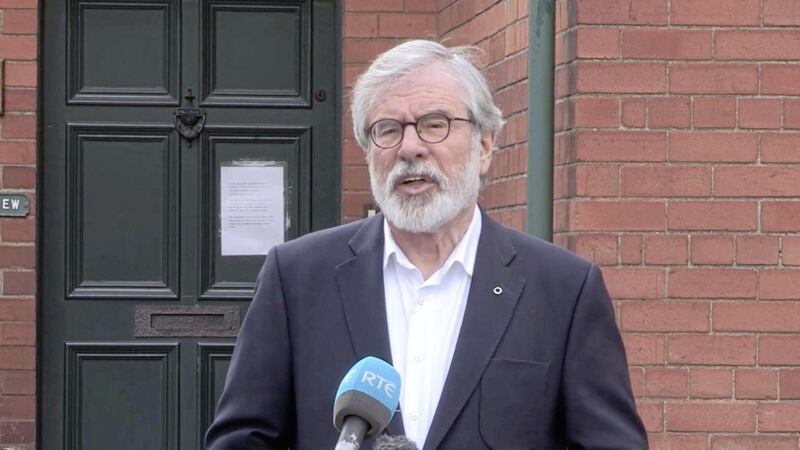If today’s mass experience is good for anything, it must be as a thinking-space.
Grief, sadness and horror are distanced from most, tamped-down dread and boredom the most common feelings. But the news that Gerry Adams, and possibly a considerable number of others, may be compensated for wrongful imprisonment should focus reflection on the policy of internment; detention without charge, trial or release date.
If it happens at all it will be a multi-faceted focus, made up of unionist scorn and fury, republican righteousness, a measure of weary satisfaction from anyone who can be doing with the prospect of money out of nowhere.
What on earth was it about? Upwards of 2,000 in the end held without charge, only 107 from the Protestant community. The effect cemented Catholic conviction of partisan ‘law and order.’ But Stormont prime minister Brian Faulkner convinced London to give the go-ahead by citing his use of internment as Home Affairs minister in the 50s. That had cut short the IRA’s ‘border campaign’, he said, sweeping over how little Catholic support the 50’s IRA had, how hobbled they were by Dublin interning as well.
Faulkner told Maurice Hayes, Community Relations Commission chair, that his intelligence sources gave him no Protestant names. He believed they had rounded up republican ringleaders. But there had been a dry run for the exercise a fortnight earlier, enough to make many leave home. Few if any major figures in the new Provisionals were ‘lifted’, Adams, for one, only interned in March the following year.
Doors smashed in at four in the morning, men and boys dragged out, a couple of 15 year olds, fathers taken because their sons weren’t there. Over 100 were released as blatantly mistaken inside 48 hours. But what Catholics saw and heard was soldiers on the rampage, callous RUC answers to distraught questioners; where have you taken my husband? What’s this for?
And then on top of days of rioting, gun-battles, an upsurge of violence that demonstrated new IRA recruitment and resolve, came reports of treatment that was brutal, if not torture.
Many, perhaps most Protestants, thought there were bound to be mistakes in a swoop that took 340 and heard exaggeration, propaganda.
Though Hayes recalled surgeon John Robb, proud of his liberal Presbyterian ancestors, phoning in distress to say that with the city in flames and injuries pouring in, doctors around him in the Royal had spent hours debating whether to fly the Union Jack for Princess Anne’s birthday.
Families were destroyed by internment, women struggling to Long Kesh with food they could not afford for their men, some of them also broken in spite of myth-making about gallant resistance, stoicism. A couple of priests as well as nationalist politicians helped families, Denis Faul, Brian Brady, both dead now, Father Raymond Murray. To the same degree as those priests became heroes to their own community, there were probably unionist families enraged by them.
For almost everyone, memories are constrained by the place they come from, family, street, district. The IRA had booby-trapped a car that killed two young policemen the previous year, the first to die in south Armagh, killed three young Scottish soldiers in March 1971, placed a bomb that killed five BBC workers.
It was a crazy time, hard to keep your feet, and your head. What stuck with many Catholics was the illegality, that a state with a record of unfairness had out-done itself. This was not what most Protestants thought. Five months later the Paras opened up on an anti-internment march in Derry; outrage among Catholics, widespread apathy streaked with cynicism among Protestants. Yet again a ‘security operation’ inflamed and divided.
The total of loyalists detained barely passed 100. In 1970 the total of ‘Troubles’ dead was twenty-nine, republicans responsible for 21, army actions for six. By the end of 1971 the toll was 180. Internment was illegal, and it killed and destroyed.








